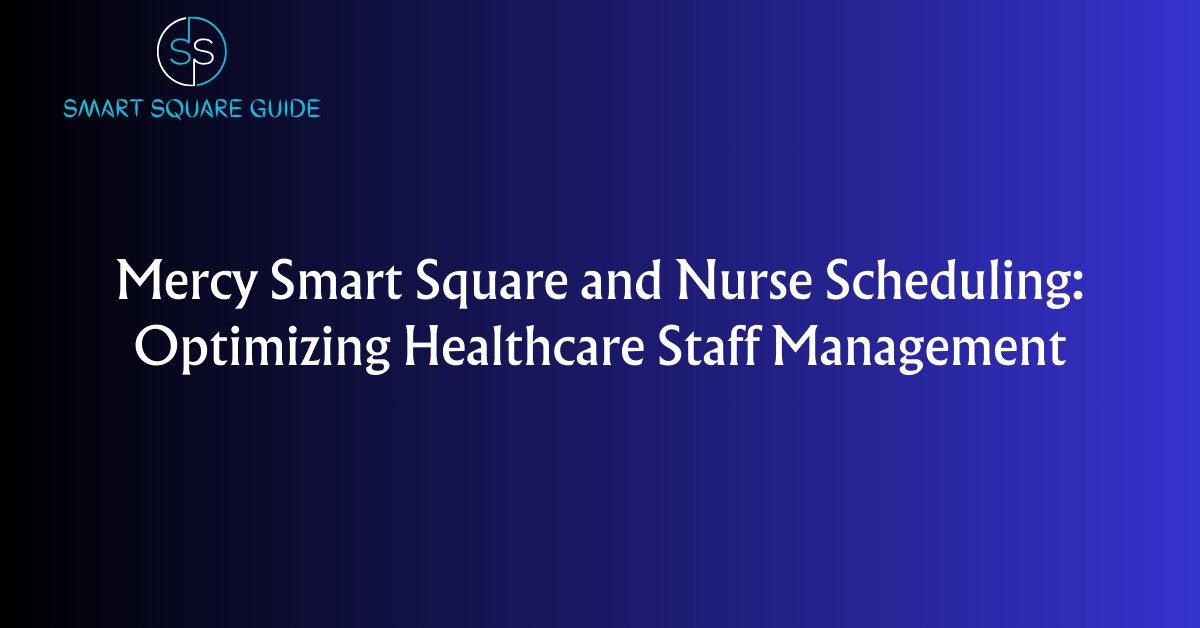Mercy Smart Square and Nurse Scheduling: Optimizing Healthcare Staff Management
In today’s fast-paced healthcare environment, efficient nurse scheduling is pivotal in ensuring quality patient care and staff satisfaction. Mercy Smart Square emerges as a cutting-edge solution to streamline nurse scheduling processes, allocate staff effectively, and manage complex shift rotations. This article will provide a comprehensive guide on implementing Mercy Smart Square in a healthcare setting, address potential challenges, and explore best practices.

Mercy Smart Square
At its core, Mercy Smart Square is a sophisticated workforce management tool tailored for the healthcare sector. It empowers healthcare facilities to easily create, manage, and optimize nurse schedules. The device utilizes advanced algorithms and user-friendly interfaces to streamline scheduling tasks and enhance staff allocation accuracy.
Benefits of Using Mercy Smart Square
Implementing Mercy Smart Square yields several key advantages. By automating scheduling processes, healthcare administrators can save time, reduce errors, and ensure equitable distribution of shifts. Moreover, the tool’s data-driven insights enable proactive adjustments to staffing levels, enhancing operational efficiency and reducing unnecessary labour costs.
Step-by-Step Implementation Guide
- Assessment and Planning: Evaluate your facility’s scheduling needs and goals. Identify challenges and opportunities for improvement.
- Gathering Data: Collect relevant data such as nurse availability, skill sets, and patient demand patterns.
- Customization: Configure Mercy Smart Square according to your facility’s requirements, including shift types, policies, and staffing rules.
- Input Data: Input nurse preferences, availability, and any relevant constraints into the system.
- Generating Schedules: Let the tool create initial schedules based on the input data and algorithms.
- Review and Adjustment: Review the generated schedules, make necessary adjustments, and ensure compliance with labor laws.
- Communication: Communicate the schedules to nurses through the platform and gather feedback.
- Ongoing Monitoring: Continuously monitor schedule performance and make real-time adjustments as needed.
- Training: Train staff on how to use Mercy Smart Square effectively.
Optimizing Staff Allocation with Mercy Smart Square
One of the tool’s standout features is its ability to match nurse skills, availability, and preferences to specific shifts. This ensures that the proper nurse is assigned the right task, improving patient care quality and staff satisfaction.
Managing Shift Rotations for Nurses
Mercy Smart Square simplifies complex shift rotations by considering seniority, preferences, and workload distribution. This reduces the administrative burden and enhances nurse morale and engagement.
Addressing Potential Challenges
Implementing a new scheduling system may face resistance or technical challenges. Addressing these concerns proactively through clear communication, training, and support is crucial to successful adoption.
Best Practices for Successful Implementation
- Involve stakeholders from various departments in the planning process.
- Provide comprehensive training to all users.
- Maintain open communication channels for feedback.
- Regularly review and adjust the scheduling algorithms for optimal results.
Real-world Success Stories
Numerous healthcare facilities have reported remarkable improvements in scheduling efficiency and nurse satisfaction after adopting Mercy Smart Square. One hospital, for instance, saw a 30% reduction in scheduling errors and a 20% increase in staff morale within six months of implementation.
Impact on Patient Care
Efficient nurse scheduling directly impacts patient care quality. When nurses are assigned appropriately based on their skills and availability, patients receive better care, improving outcomes and higher patient satisfaction scores.
Ensuring Compliance and Fairness
Mercy Smart Square aids in complying with labor laws by preventing overworking and ensuring fair distribution of shifts. This reduces nurses’ burnout risk and promotes a healthier work environment.
Continuous Monitoring and Improvement
Regularly assess the scheduling process and gather feedback from nurses and administrators. Adjust the system parameters as needed to enhance scheduling accuracy and efficiency continuously.
User Experience and Interface
Mercy Smart Square boasts an intuitive interface that simplifies the scheduling process. Its user-friendly design minimizes the learning curve, making it accessible to staff members of all technical backgrounds.
Integration with Other Systems
The tool’s compatibility with other healthcare management systems ensures seamless data exchange and comprehensive insights. This integration further enhances the accuracy of scheduling decisions.
FAQs
What is Mercy Smart Square, and how does it benefit healthcare facilities?
Mercy Smart Square is a state-of-the-art workforce management tool designed specifically for the healthcare industry. It enables healthcare facilities to streamline nurse scheduling processes, allocate staff effectively, and manage shift rotations seamlessly. The device utilizes advanced algorithms and user-friendly interfaces to create schedules that align with nurse availability, skills, and preferences. The benefits include improved operational efficiency, reduced scheduling errors, equitable shift distribution, enhanced nurse satisfaction, and improved patient care outcomes.
Can Mercy Smart Square handle complex nurse scheduling scenarios?
Yes, Mercy Smart Square is engineered to handle many complex scheduling scenarios in healthcare settings. Whether it’s managing varying nurse skills, handling different shift lengths, or accommodating specific nurse preferences, the tool’s sophisticated algorithms can adapt and create schedules that meet the facility’s unique requirements.
How does Mercy Smart Square optimize staff allocation?
Mercy Smart Square optimizes staff allocation by analyzing nurse skills, availability, patient demand patterns, and shift preferences. The tool’s algorithms match the proper nurse to the right shift, ensuring that the staff members with the appropriate skills and experience are assigned to the tasks that suit them best. This precision in staff allocation improves patient care quality and nurse job satisfaction.
What challenges might healthcare facilities face during implementation?
Implementing a new scheduling system like Mercy Smart Square might encounter challenges such as resistance to change from staff, technical difficulties in setting up the software, or concerns about equitable shift distribution. To address these challenges, it’s essential to communicate the new system’s benefits, provide comprehensive training to all users, offer ongoing support, and involve key stakeholders in decision-making.
What are the key steps to effectively implement Mercy Smart Square?
Implementing Mercy Smart Square involves several crucial steps:
- Assessment and Planning: Evaluate the facility’s scheduling needs and set clear goals.
- Gathering Data: Collect nurse availability, skill sets, and historical scheduling data.
- Customization: Configure the tool according to the facility’s policies and rules.
- Input Data: Enter nurse preferences, availability, and constraints into the system.
- Generating Schedules: Let Mercy Smart Square create initial schedules based on the input data.
- Review and Adjustment: Review and adjust schedules as needed, ensuring compliance with labour laws.
- Communication: Communicate schedules to nurses and gather their feedback.
- Ongoing Monitoring: Continuously monitor schedule performance and make real-time adjustments.
- Training: Provide comprehensive training to staff members on using the tool effectively.
